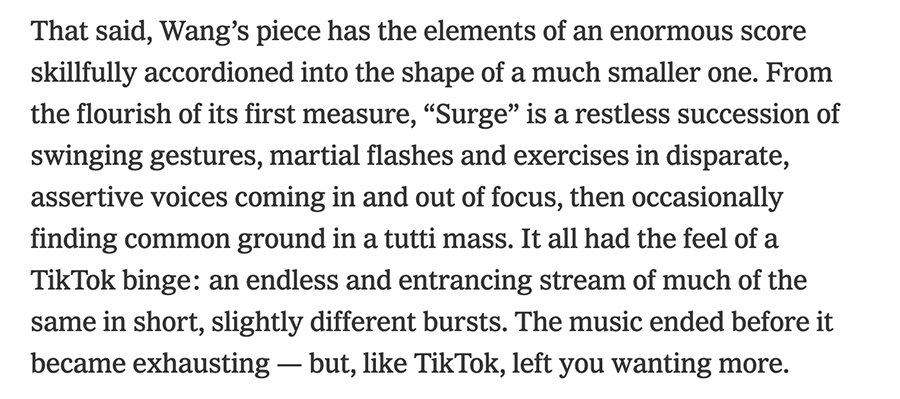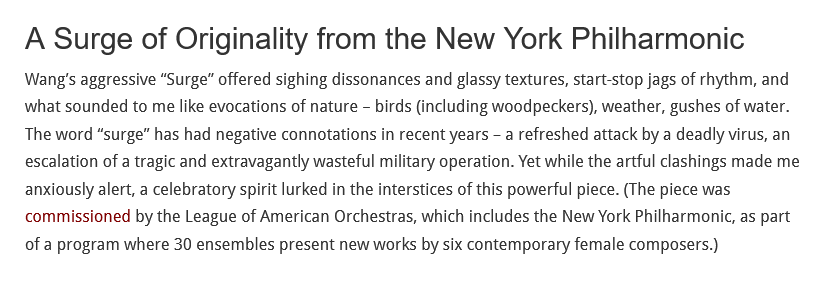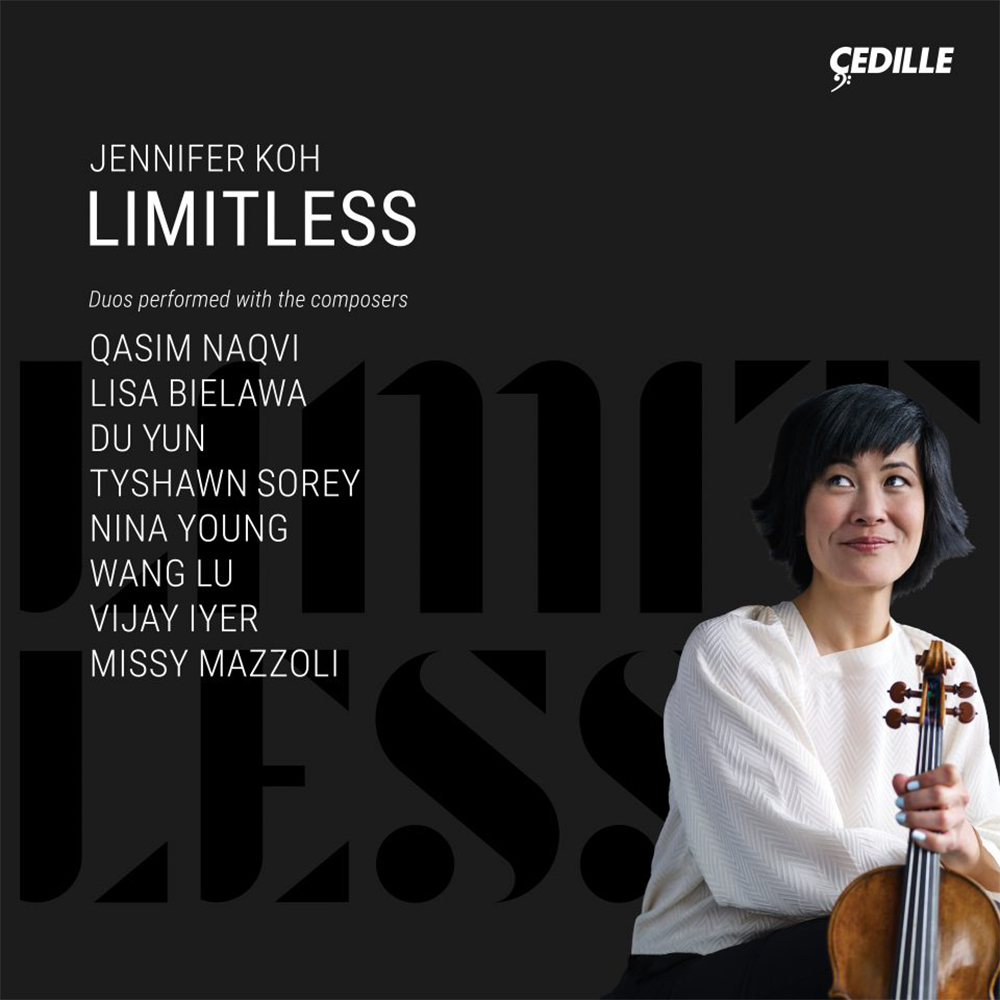

Review of Shout-out

Review on “Surge” performed by the Cincinnati Symphony from the Cincinnati Business Courier
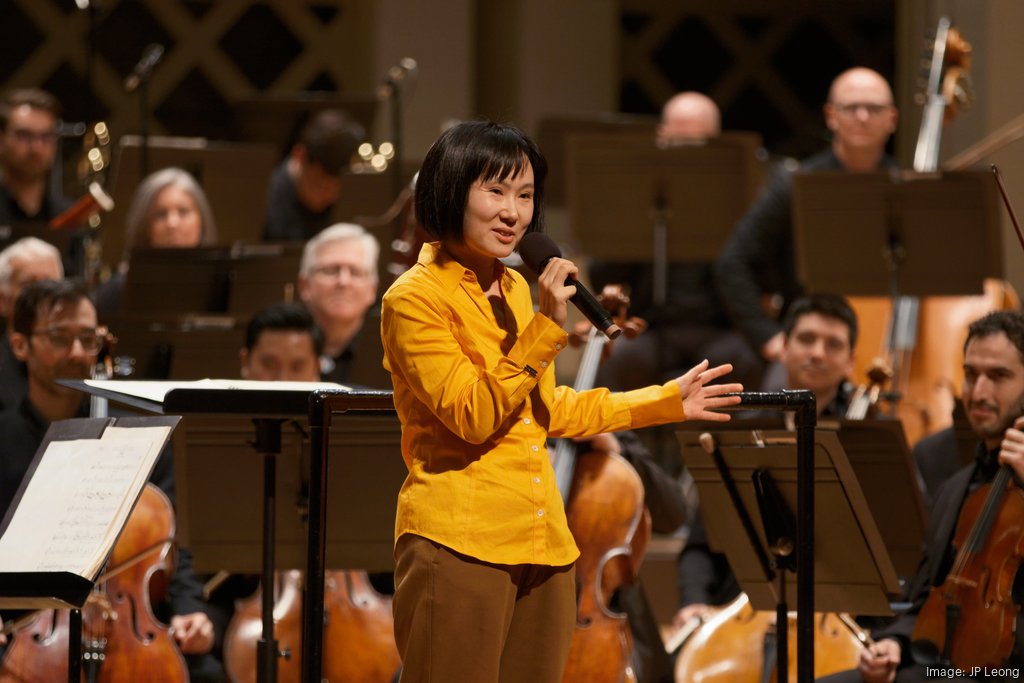
Composer Wang Lu introduces her work “Surge,” which opened the CSO program on Oct. 26. photo credits: JP Leong
Tebar opened the evening with Wang Lu’s “Surge,” a work commissioned by the League of American Orchestras, and premiered in 2023 by the New York Philharmonic. Born in 1982 in Xi’An, China, the award-winning composer is now associate professor of music at Brown University. She told the audience that she took her inspiration from great symphonic repertoire, including Cincinnati Symphony albums, as well as snippets of music emanating from conservatory practice rooms. She also imagined the Philadelphia Orchestra’s 1973 performances in Shanghai during the Cultural Revolution.
That was a lot of inspiration to fit into a six-minute work, but Wang Lu’s work engaged the ear at every turn. The piece began with a flourish that was slightly jazzy – with slapping pizzicatos in the basses. Harmonies soon became more dissonant as they moved in parallel motion. A section of atmospheric sonorities was colored by glissandos in strings and harp. Staccato figures ricocheted across the orchestra in an appealing tapestry. It was a bright, bold piece, and Tebar led its varied moments vividly.

Des Moines Symphony Performs Wang Lu’s New “Surge”
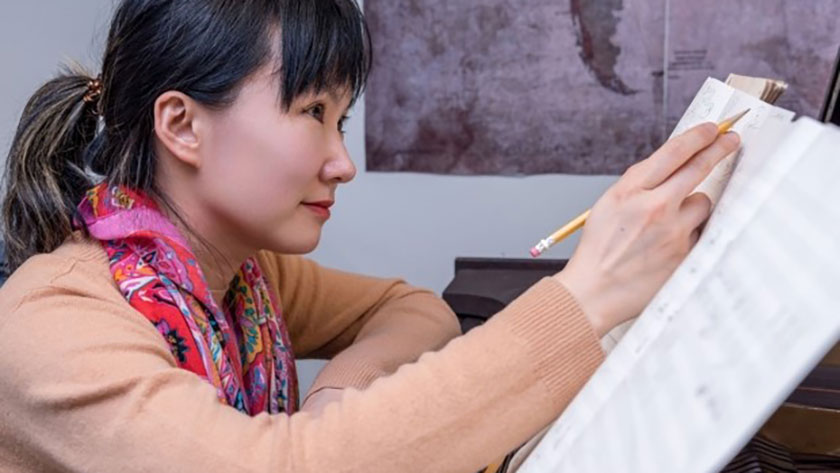
Composer Wang Lu at work. Photo by Deirdre Confar.
“She isn’t intimidated to compose new music that will rub elbows with time-tested classics. She’s written music inspired by the birth of her first child, layoffs at a textile factory in her hometown and even the frantic buzz of online dating.” Surge was commissioned by the League of American Orchestras with the generous support of the Virginia B. Toulmin Foundation."

Seattle Modern Orchestra presents world premiere by acclaimed composer
Wang’s latest composition, “The Nothing Man and Other Tales,” taps into this human hunger by recounting a series of stories she discovered in a children’s book that her daughter has been enjoying. Her musical treatment transforms these tales into adventures for adult ears.
Seattle Modern Orchestra will give the world premiere of Wang’s new piece at Town Hall on June 3 as part of its final concert of the season. Commissioned for SMO by the Barlow Foundation, “Nothing Man” marks the second collaboration between Wang and the Seattle-based chamber orchestra, which co-artistic directors Julia Tai and Jérémy Jolley founded in 2010 to perform music from the 20th and 21st centuries. SMO balances works by local and out-of-town composers.

Review: Dalia Stasevska Leads World Premiere by Wang Lu, Plus Tchaikovsky and Sibelius, at New York Philharmonic

An interview with The Kitchen Magazine on my new piece Aftertouch for Claire Chase’s Density 2036

A featured interivew on Rates of Extinction for solo piano
“Heartbeats, pulses and rhythms, indeed, encompass Wang’s life as a musician, composer, colleague and mother. As her own program note for the piece suggests, Wang writes, “Every day, industrial expansion and the modernization of societies push the limit of earth’s natural capacity to accommodate and sustain us. Many animal species quietly suffer and become extinct due to the harsh conditions imposed by human advancement.””

The New Yorker reviews Wang Lu's Aftertouch for Claire Chase at the Kitchen

Review: ‘Density’ Keeps Expanding the Flute’s Universe
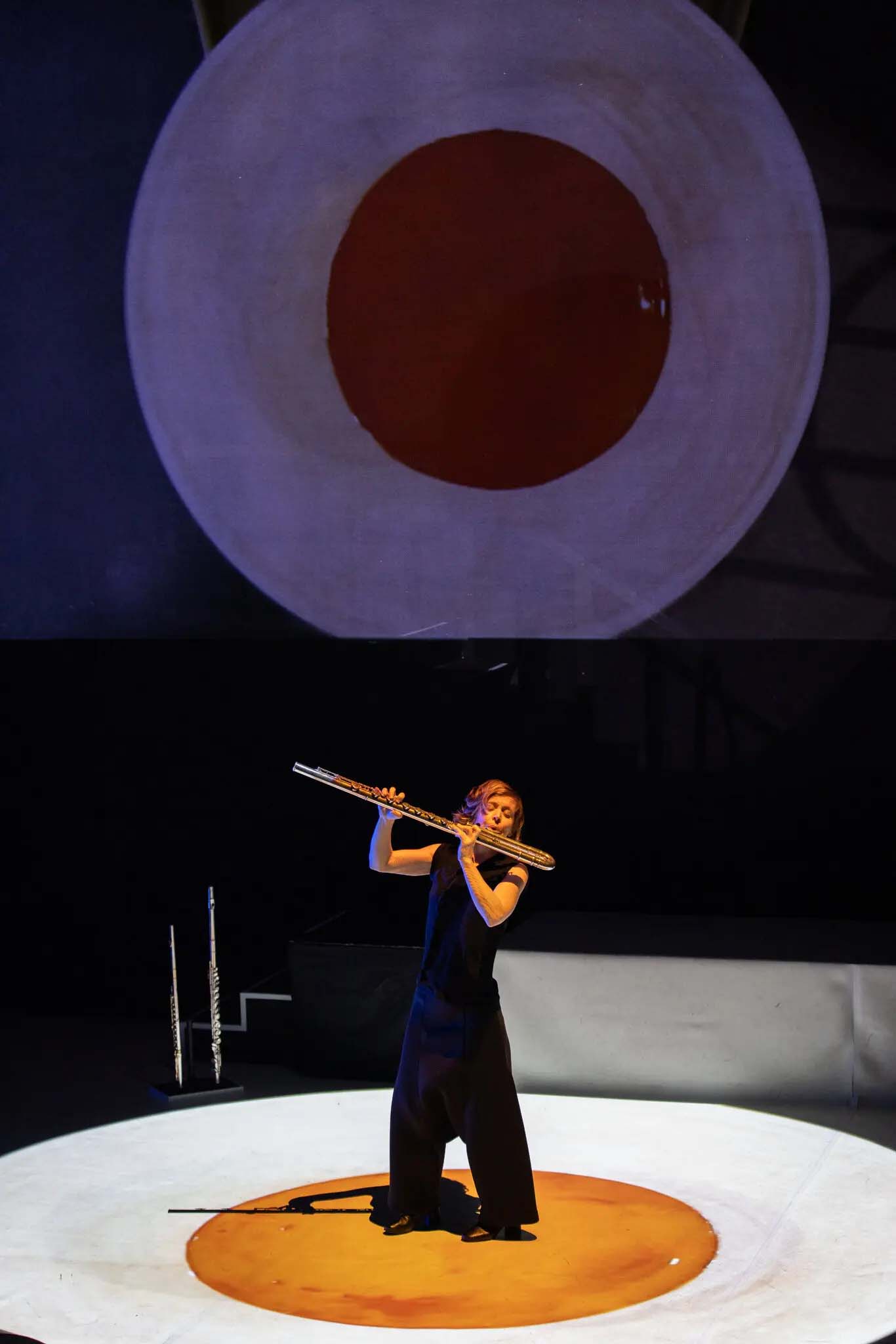
Claire Chase playing Wang Lu’s “Aftertouch,” one of three premieres in the eighth installment of “Density 2036,” at the Kitchen. Photo credit: Walter Wlodarczyk
“...The reason was clear the moment Chase began to play Wang Lu’s “Aftertouch,” which complements three types of flute with street noise, a club-worthy beat and videos, by Polly Apfelbaum, of spinning singing bowls.”
Talea Ensemble offers two premieres, better living through sound chemistry
"...Wu’s November Airs—commissioned for Talea Ensemble by the Fromm Foundation—opened with projected video of a large, ivory-colored bowl, viewed vertically, slowly rotating as if still on the potter’s wheel. At intervals as the piece progressed, a hand was seen gently placing a small bowl inside the larger one, then replacing it with a series of similar bowls in different colors."
Piano Magazine reviews Wang Lu's Rates of Extindion (2016)
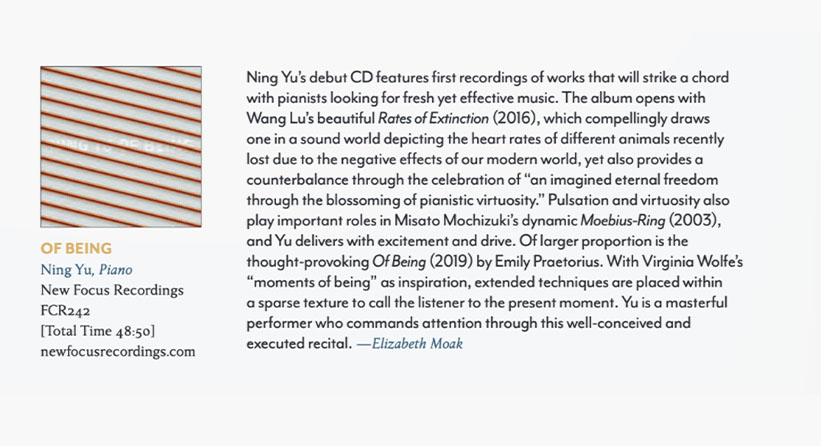
The album opens with Wang Lu's beautiful Rates of Extindion (2016), which compellingly draws one in a sound world depicting the heart rates of different animals recently lost due to the negative effects of our modern world, yet also provides a counterbalance through the celebration of "an imagined eternal freedom through the blossoming of pianistic virtuosity."

21 for ’21: Composers and performers who sound like tomorrow
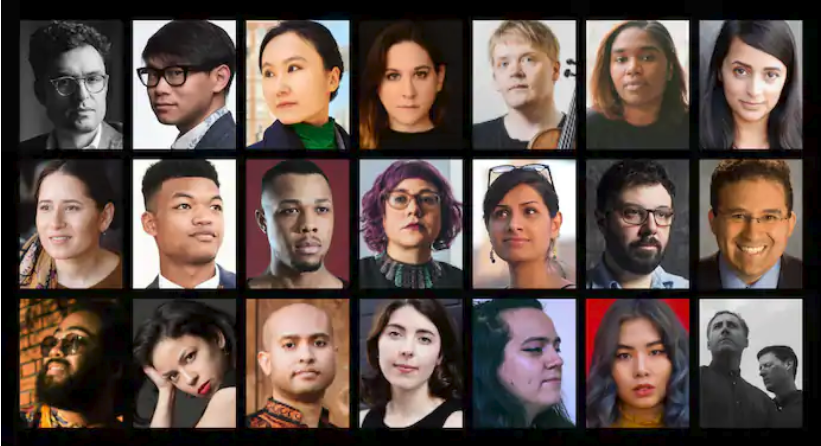
Last year, Wang, 39, released one of my favorite albums of the weird, weird year: “An Atlas of Time,” a collection of pieces composed between 2008 and 2017 (and the follow-up to 2018’s “Urban Inventory”). A single title from the collection — “Unbreathable Colors” — may indeed tell you more than any blurb could about Wang’s approach to time and sound, unbound by language or expectation, and here and there so fragile it’s as if your attention alone is holding it together. In June, she’ll premiere a work for Philadelphia-based choir the Crossing. wanglucomposer.com.

Wang Lu awarded 2021 Wladimir and Rhoda Lakond award from The American Academy of Arts and Letters
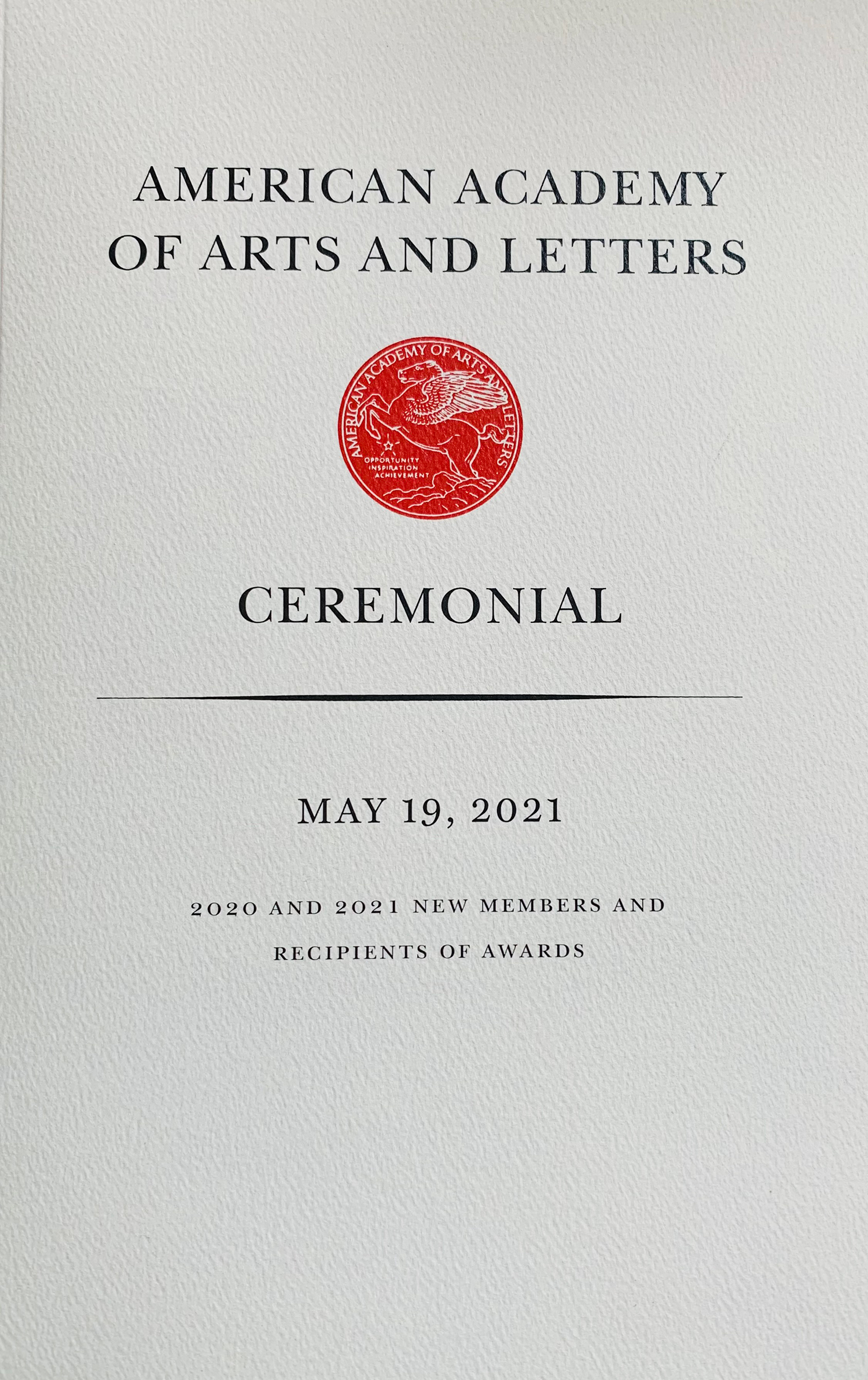
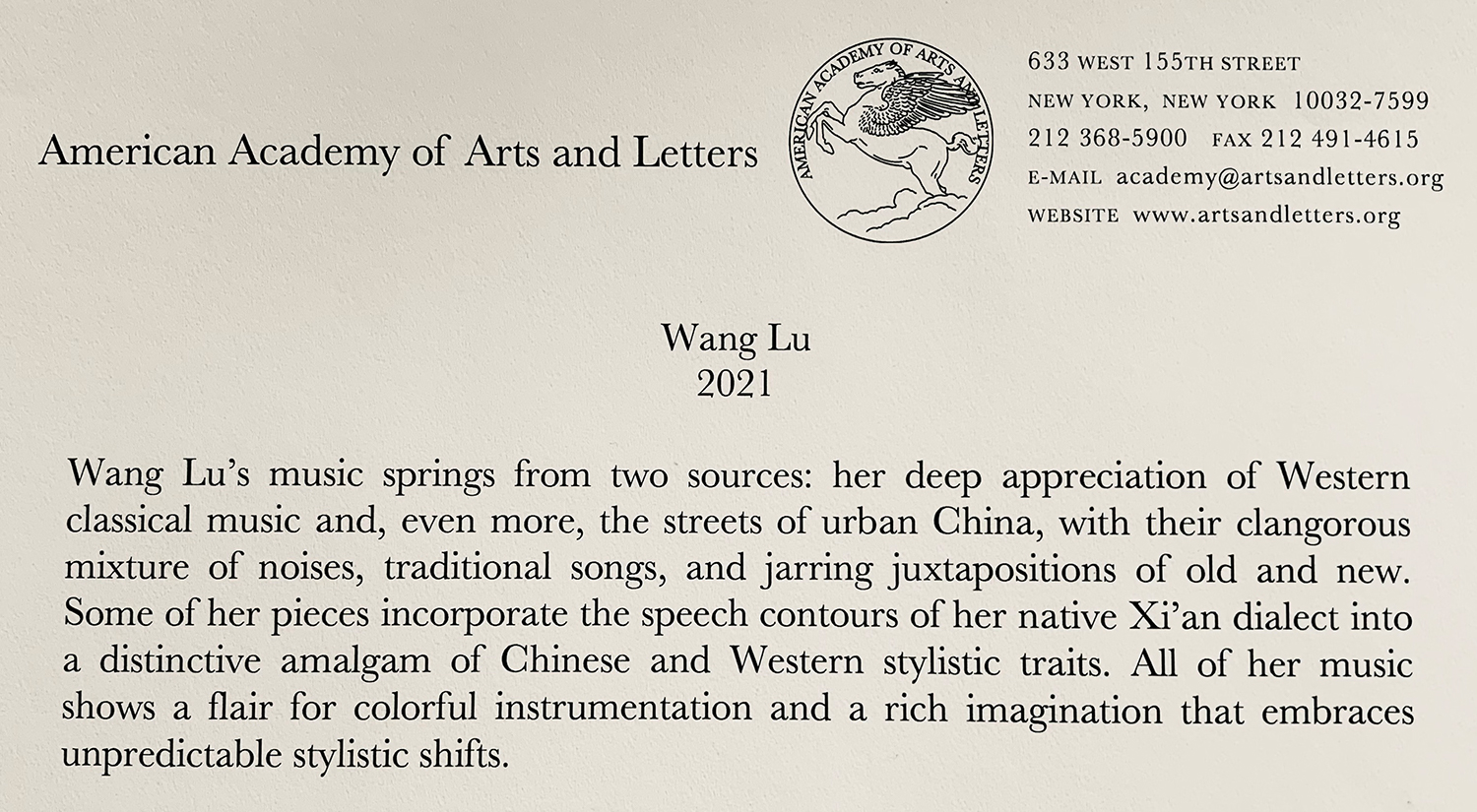 New York, February 22, 2021—The American Academy of Arts and Letters announced today the 18 recipients of this year’s awards in music, which total $225,000. The winners were selected by a committee of Academy members: Chen Yi (chair), Robert Beaser, Martin Bresnick, Stephen Hartke, George Lewis, Shulamit Ran, and Julia Wolfe. The awards will be presented virtually at the Academy’s Ceremonial on May 19, 2021. Candidates for music awards are nominated by the 300 members of the Academy.
New York, February 22, 2021—The American Academy of Arts and Letters announced today the 18 recipients of this year’s awards in music, which total $225,000. The winners were selected by a committee of Academy members: Chen Yi (chair), Robert Beaser, Martin Bresnick, Stephen Hartke, George Lewis, Shulamit Ran, and Julia Wolfe. The awards will be presented virtually at the Academy’s Ceremonial on May 19, 2021. Candidates for music awards are nominated by the 300 members of the Academy.
An interview by PSNY: Listening to Social (and Musical) Distance with Wang Lu
Wang Lu is a composer whose work has explored ideas of the distances of time, memory, and place—often evoking, recreating, altering, manifesting places and times from her own distant memories. The titular work on her recently-released album, An Atlas of Time, maps and remembers sound and space from her own past: the opening melody of a children’s television broadcast is reincarnated in the strangeness of the present; fragments of the ambitiously trans-historical "Internationale" struggle among instruments responding to its insistent reemergence. In this sense, Wang’s pre-COVID music was already exploring ideas of “social distance”: a kind of musical sociality between people that connects them through time and space.

Wang Lu’s An Atlas of Time Conjures Vivid Memories
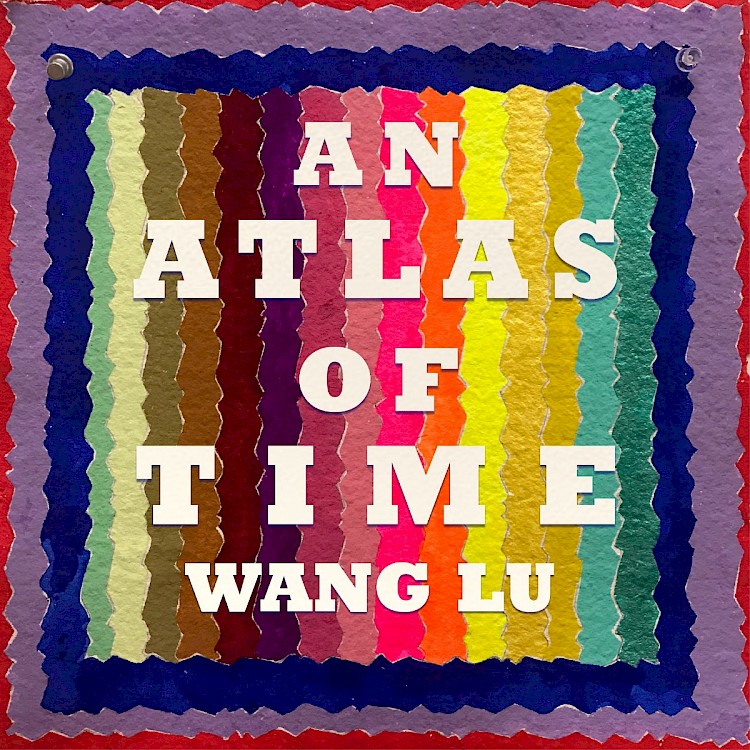
The works of Chinese-American composer Wang Lu unfold like pop-up books. Each brief movement releases a whirligig of hues and textures — far more activity than seems physically possible to pack in. Yet for all its charming eccentricity and sense of play, her music isn’t merely a cardboard magic-trick to entertain. Highly evocative sonic images conceal secret compartments with deep personal significance.

An Atlas of Time: Wang Lu Explores the Imperfect Cartography of Memory

Wang Lu: An Atlas of Time (New Focus Recordings)
Two years have passed since the release of Wang Lu’s debut album Urban Inventory, making the release of her second album, An Atlas of Time (New Focus Recordings), a compelling expansion of her artistic range.

The Best Contemporary Classical Albums of 2020

Wang Lu: An Atlas of Time (New Focus Recordings)
On this bracing new collection of pieces written between 2008 and 2017, Chinese-American composer Wang Lu powerfully translates disparate perceptions of time within a very diverse program.

Rates of Extinction, Review from I care if you listen
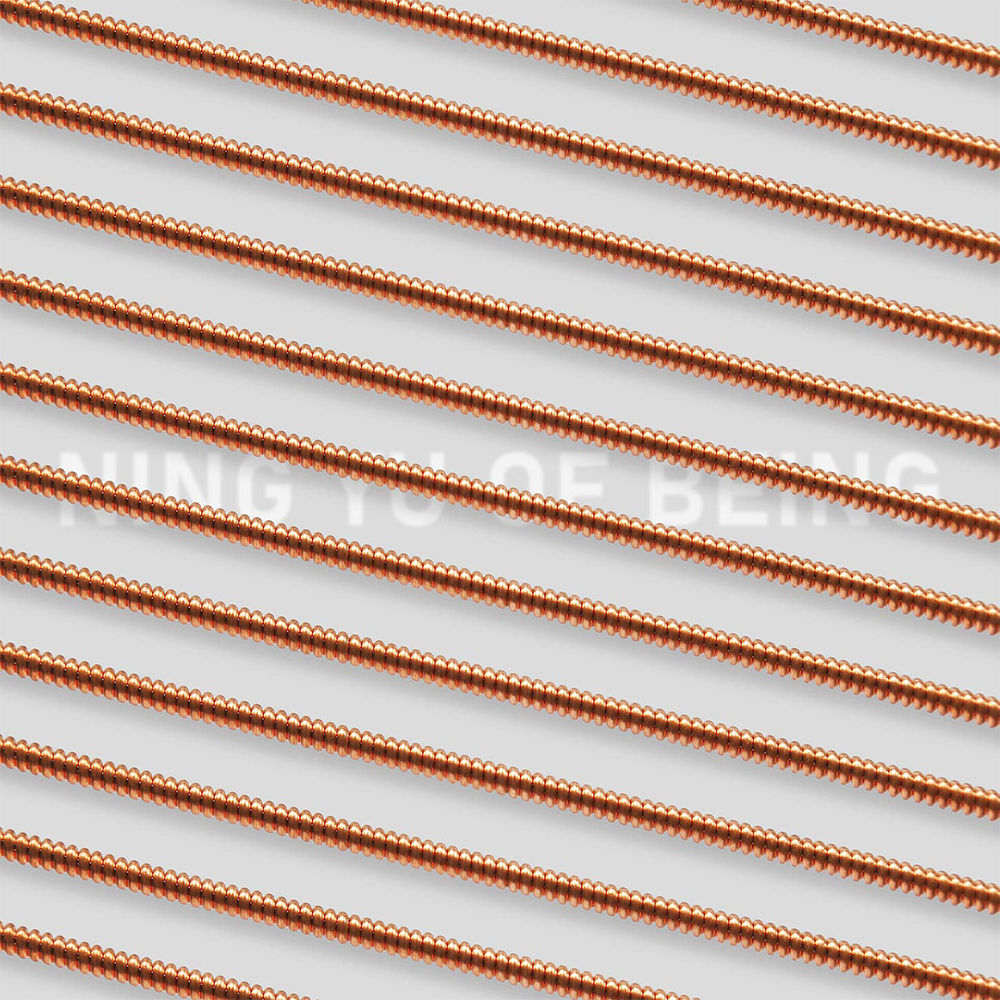
Wang Lu’s Rates of Extinction (2016) is a multi-movement work that presents five relatively short unnamed movements, each with its own unique character, unified aesthetically through various multi-layered minimalist polyrhythms interjected with motivic fragments in perpetual orbit.

[Press Release] Wang Lu Selected for Chicago Opera Theater’s Vanguard Emerging Opera Composer Program
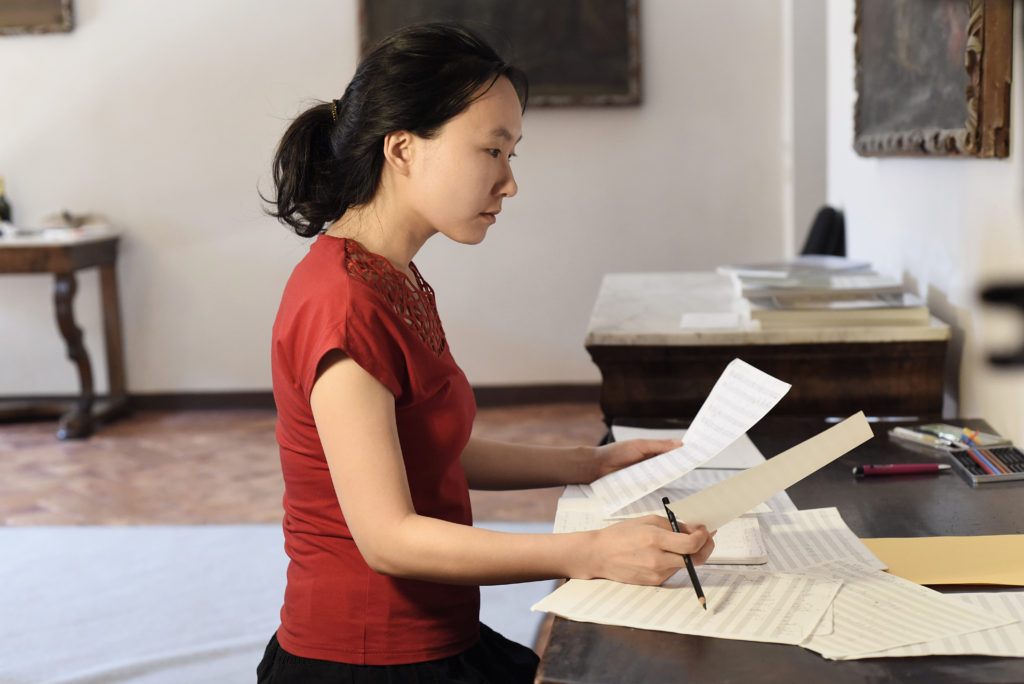 Composer Wang Lu
Composer Wang LuChicago Opera Theater’s (COT) Vanguard Emerging Opera Composer Program is a two-year development program that places an emphasis on building skills and connections for emerging opera composers in Chicago and the Midwest. This program offers a competitive living monthly stipend.
The Vanguard Emerging Opera Composer Residency aims to bridge the gap between general compositional skills taught in university music programs and the real-world observation and experience that help inform an operatic composer’s work. Launched in 2018, the program identifies skilled composers who have not yet had sufficient opportunities for writing opera and provides them with a stipend and a two-year comprehensive course of study.

Chicago composer Wang Lu links cultures through music with ‘Code Switch’
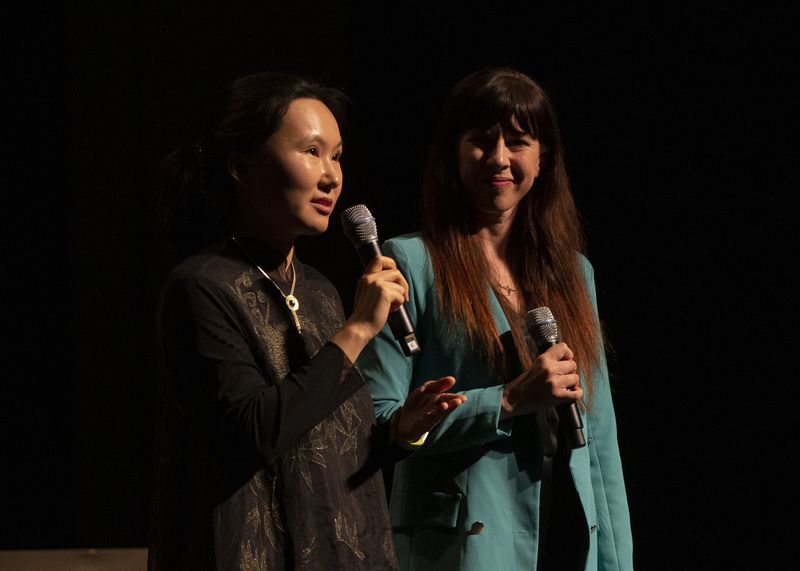 Composer Wang Lu (left) and MusicNOW curator Missy Mazzoli speak to the audience about the world premiere of Wang Lu's "Code Switch" at the Harris Theater on Monday evening. (Camille Fine / Chicago Tribune)
Composer Wang Lu (left) and MusicNOW curator Missy Mazzoli speak to the audience about the world premiere of Wang Lu's "Code Switch" at the Harris Theater on Monday evening. (Camille Fine / Chicago Tribune)The evening opened with the world premiere of Chicago composer Wang Lu’s fanfare “Code Switch” (2019), a MusicNOW commission. But this was not a fanfare by any conventional definition. For if we think of that idiom as clarion horns crisply articulating rousing phrases, “Code Switch” went in quite another direction. Scored for horn, two trumpets, trombone and percussion, the work was predicated on overlapping lines, bent pitches, blurred ensemble textures and an unmistakable sense of rhythmic freedom. This was a fanfare of joy and exuberance, and it was performed accordingly.

Urban Inventory Reviews
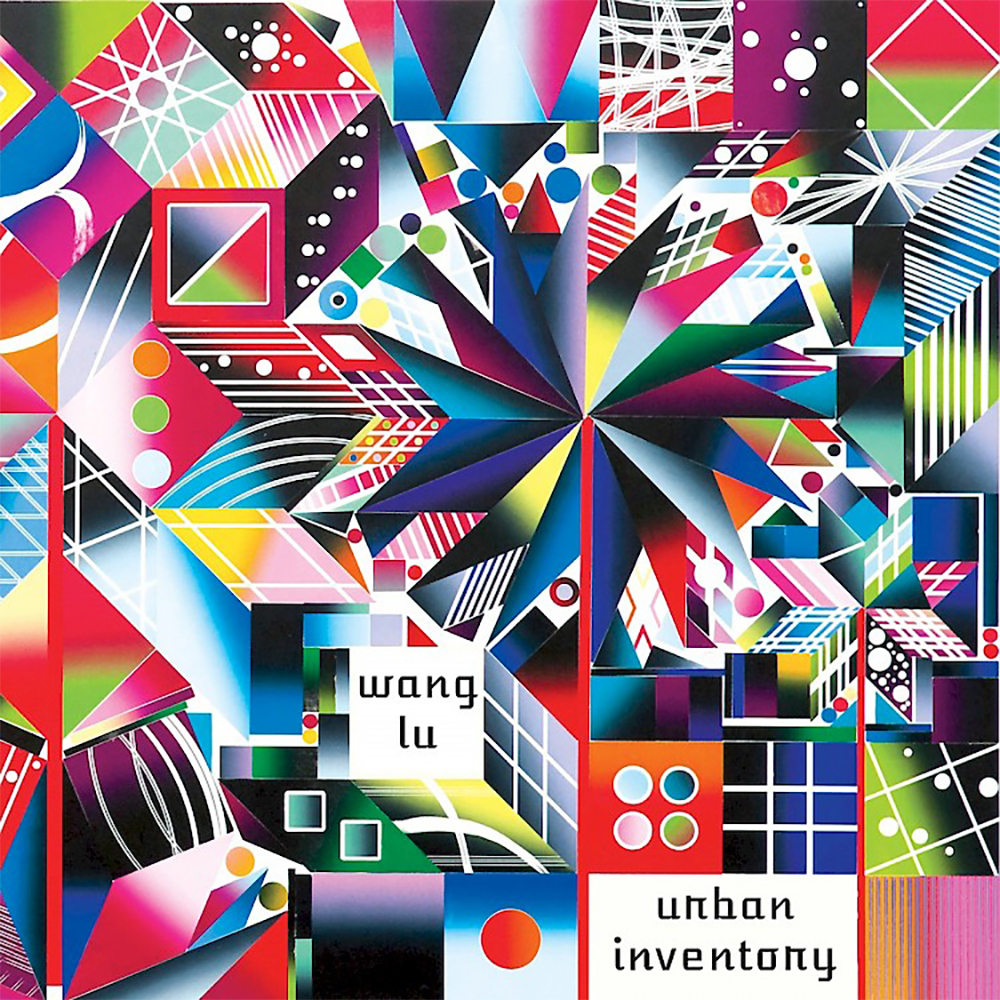 I’ve listened at least a dozen times to the composer Wang Lu’s new album, “Urban Inventory” (New Focus Recordings), and remain happily lost in its riotous maze of ideas and images. Every moment is vividly etched, drenched in instrumental color, steeped in influences that range from ancient Chinese folk music to the latest detonations of the European avant-garde. A starry array of ensembles, including the Ensemble Intercontemporain, Alarm Will Sound, and the International Contemporary Ensemble, bring the music to rambunctious life. The flow of events is so rapid and so variegated that nothing settles into the groove of the familiar.
I’ve listened at least a dozen times to the composer Wang Lu’s new album, “Urban Inventory” (New Focus Recordings), and remain happily lost in its riotous maze of ideas and images. Every moment is vividly etched, drenched in instrumental color, steeped in influences that range from ancient Chinese folk music to the latest detonations of the European avant-garde. A starry array of ensembles, including the Ensemble Intercontemporain, Alarm Will Sound, and the International Contemporary Ensemble, bring the music to rambunctious life. The flow of events is so rapid and so variegated that nothing settles into the groove of the familiar.
The Week in Classical Music
The playing at Miller was sharp, particularly in the 2008 chamber work “Siren Song,” which includes passages of acidic squall, as well as pools of melodic reverie. Yet in other works, the players’ acute emphasis on more striated textures occasionally seemed to lose sight of a fine balance between rupture and reflection that can be heard in this composer’s music — as in the final movement of “Urban Inventory,” during which traces of a recording by the pop singer Yang Yuying can be heard.

Chicago composer Wang Lu links cultures through music with ‘Code Switch’

Composer Portrait: Wang Lu
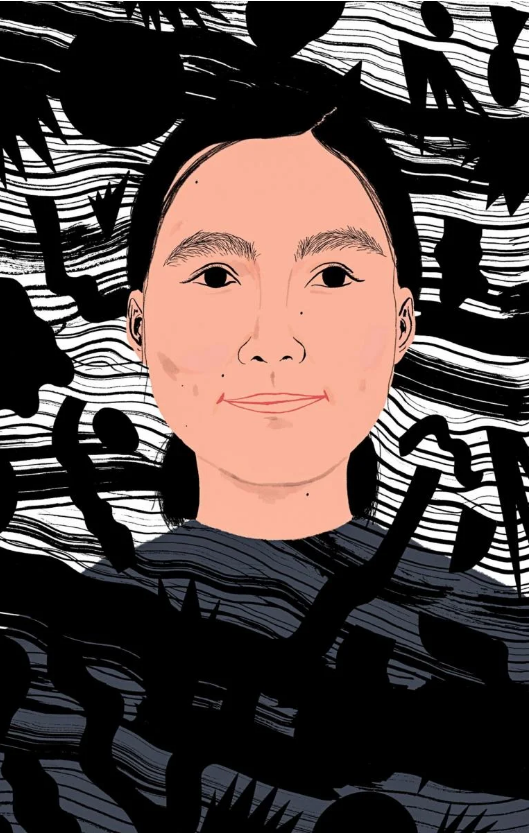 Illustration by Paige Vickers
Illustration by Paige Vickers“Urban Inventory,” an album released to wide acclaim last year by the feisty Brooklyn label New Focus Records, offers listeners a dizzying but delectable introduction to Wang Lu, a Chinese-born composer and pianist presently serving on the faculty of Brown University. The album features a fistful of admirable ensembles performing modernist works that incorporate both ancient folkloric evocations and thoroughly contemporary field recordings, fashioned with wide-open ears and penetrating wit. Those qualities will also be evident in a Composer Portrait concert at Miller Theatre on Feb. 21, in which two vital New York groups—International Contemporary Ensemble and Yarn/Wire—present a mix of new and recent pieces by Wang Lu, including a world première inspired by a visit to a textile factory near her birthplace.

More People Need to Know About Wang Lu
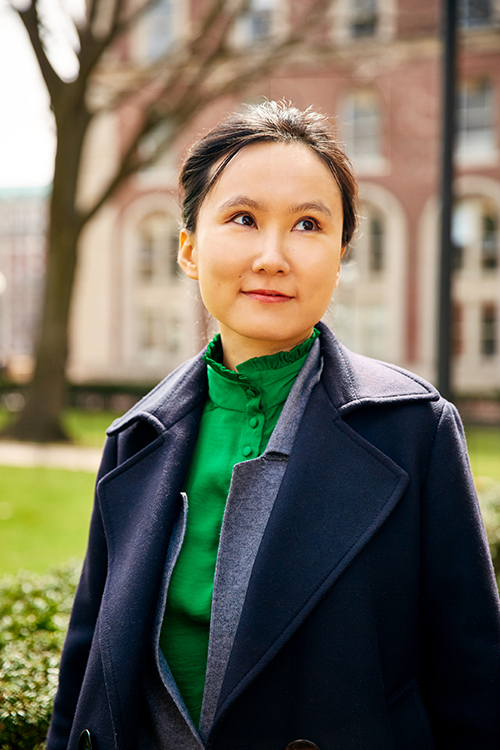 Wang Lu, photo by Matt Zugale
Wang Lu, photo by Matt ZugaleMiller Theatre commissioned writer Lara Pellegrinelli to create this season’s Composer Portraits program notes, as well as a series of Q&As with Executive Director Melissa Smey. Here is the fourth installment, centering around our upcoming evening of music from composer Wang Lu.

US-China Forum 2020: The Matter of Art to be hosted by University of Chicago on Feb. 6

The Week in Arts
Feb 21; millertheatre.com.
In the composer Wang Lu’s 2015 chamber work “Urban Inventory,”chromatic smears of instrumental color accrue into a playful depiction of an afternoon in a Chinese city park. Her scores use interwoven gestures that simultaneously evoke tradition and modernity — one piece depicts the frenetic pace of Tinder while quoting Wagner’s “Tristan und Isolde” — and recall the tonal language of her native China, creating a rich polyphony of musical conversations.
“Urban Inventory,” recorded deftly on a 2018 album, is one highlight of a portrait concert that Columbia University’s Miller Theater is devoting to her music on Thursday, Feb. 21. Lu is herself a recent Columbia graduate, and the Miller concert will feature performances by the International Contemporary Ensemble and Yarn/Wire and the premiere of a new work titled."

Notable Performances and Recordings of 2018
 Wang Lu, “Urban Inventory” and other works
Wang Lu, “Urban Inventory” and other worksThird Sound Ensemble, Holland Symfonia, Alarm Will Sound, Le Nouvel Ensemble Moderne, International Contemporary Ensemble, Ensemble Intercontemporain (New Focus)”
Her Latitude Recording Review
“Wang Lu and her electronics grace "Her Latitude." What sounds like Tibetan Buddhist chant sets up the opening backdrop along with air-raid sirens and it goes from there as a kind of musical equivalent to a Koh biography. Ms. Lu responds at times improvisationally to Jennifer's violin. The entire piece has an aural, concrete and holistic logic that is beyond words, always vivid, while the elctronics combine "spiritual calm and catastrophic unrest," according to the liners. You can hear that, quite effectively so...”
Urban Inventory Reviews
 "...This album reveals [Wang Lu's] strong personality and vivacious spirit, supported by very solid technique. It also reflects the young pianist and composer’s various sources of inspiration.
"...This album reveals [Wang Lu's] strong personality and vivacious spirit, supported by very solid technique. It also reflects the young pianist and composer’s various sources of inspiration.The disc opens with urban ambiances: Urban Inventory (2015), for flute, clarinet, violin, cello and piano, consists of five snapshots in which street recordings (pop songs, words, laughter, a most likely patriotic female chorus) are intermingled with airy, clear and colorful instrumental writing, energetically rendered by New York’s Third Sound Ensemble. The third piece, Gifts of Gab, divulges Wang Lu’s particular interest in the tonalities of the spoken voice, confirmed in Cross-Around (2010) and especially in Past Beyond (2012), in which a phoneme-free arc encounters the rawness of a brass- and cymbal-rich orchestration, clearly yet peripherally evoking Tibetan rituals. The astringency of this episode is well-suited to the Ensemble Intercontemporain.
The cries in Wailing (2009) echo childhood memories—a Chinese village in which young peasants alternately weep and, at weddings and funerals, play poorly tuned brass and folk instruments and percussion. Here, the melodic contour of an a priori non-musical sound is key, but also leans on the improvised jazz sounds of clarinet glissandi.
The subject of Cloud Intimacy (2016)—a virtual existence on social networks, an oversaturation of images and messages—could have yielded an anecdotal piece. Instead, Wang Lu pitches the International Contemporary Ensemble an ideal scenario in which to exercise its responsiveness. Frenzy, permanent switches, jingles and the invasion of notification tones build up an extremely coherent and controlled narrative. This is a particularly exhilarating anthology of scores and collaborative ensembles."

After some remarks by C.W Recording Review
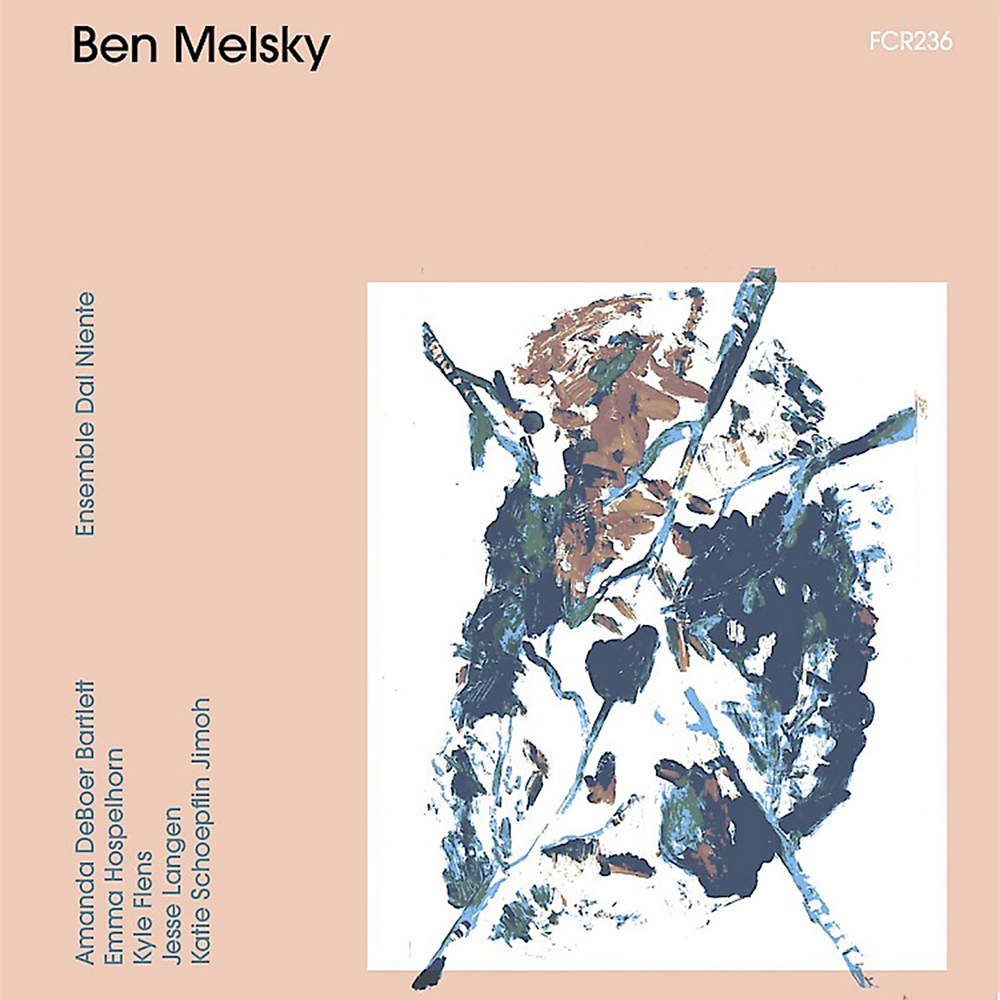
Wang Lu’s After some remarks by CW on his work is pleasantly striking in its exploration of opposites. Earthy clarinet multiphonics open the piece accompanied by the ethereal texture of low clusters and resonant harmonics in the harp. The exploration of glissando returns in this track, and Wang Lu’s use of detuning perfectly balances familiarity and variety with goosebump-inducing effectiveness.
After some remarks by C.W Recording Review
After some remarks by C.W Recording Review
After some remarks by C.W Recording Review
“Wang Lu’s After some remarks by CW on his work (2018) for harp and clarinet blends ample open spaces, multiphonics from Katie Schoepflin’s clarinet, and harp harmonics in a sequence of sound-islands of uncanny, composite timbres.”

Wang Lu: Urban Inventory
 Still in her early 30s, Wang Lu is evolving a musical language which is underpinned by her Chinese roots and background, but seems more concerned with taking its cue from what she sees around her. It has been said of her that she sees music as integral to the fabric of life itself, where the past and present coexist, and where cultures, ages, and languages freely intermingle in a kind of cosmopolitan goldfish bowl. Her music is clearly a reflection of a society where ethnic and sociological differences are consciously blurred in an endeavour to create cultural integration...
Still in her early 30s, Wang Lu is evolving a musical language which is underpinned by her Chinese roots and background, but seems more concerned with taking its cue from what she sees around her. It has been said of her that she sees music as integral to the fabric of life itself, where the past and present coexist, and where cultures, ages, and languages freely intermingle in a kind of cosmopolitan goldfish bowl. Her music is clearly a reflection of a society where ethnic and sociological differences are consciously blurred in an endeavour to create cultural integration...

[Album Review] Wang Lu: Urban Inventory

Review of Urban Inventory performed by The Third Sound Ensemble at the Bard Music West

Wang Lu: Urban Inventory
 ...Finally, I’ve included albums by two young Chinese-born, American-based composers: Du Yun and Wang Lu. While some of their works include references to the musical traditions of their homeland, Sino-Western hybridization isn’t as much of an aesthetic concern for them as it was for an older generation of Chinese émigré composers like Tan Dun, Chen Yi, or Bright Sheng. Rather, Du and Wang engage with a contemporary, globalized culture, constructing digital-age collages that draw heavily on pop and electronica. Wang’s ensemble work Cloud Intimacy explores a far less abusive form of intimacy, though one marked by the cold impersonality of technology. Passionate themes from Tristan are rendered droopy and lethargic in Wang’s bastardized quotations—Wagner’s musical representations of unbridled love are constantly interrupted by samples of cell-phone text-message tones, as well as clever acoustic imitations of these cellular pings and chimes from members of the International Contemporary Ensemble.
...Finally, I’ve included albums by two young Chinese-born, American-based composers: Du Yun and Wang Lu. While some of their works include references to the musical traditions of their homeland, Sino-Western hybridization isn’t as much of an aesthetic concern for them as it was for an older generation of Chinese émigré composers like Tan Dun, Chen Yi, or Bright Sheng. Rather, Du and Wang engage with a contemporary, globalized culture, constructing digital-age collages that draw heavily on pop and electronica. Wang’s ensemble work Cloud Intimacy explores a far less abusive form of intimacy, though one marked by the cold impersonality of technology. Passionate themes from Tristan are rendered droopy and lethargic in Wang’s bastardized quotations—Wagner’s musical representations of unbridled love are constantly interrupted by samples of cell-phone text-message tones, as well as clever acoustic imitations of these cellular pings and chimes from members of the International Contemporary Ensemble.
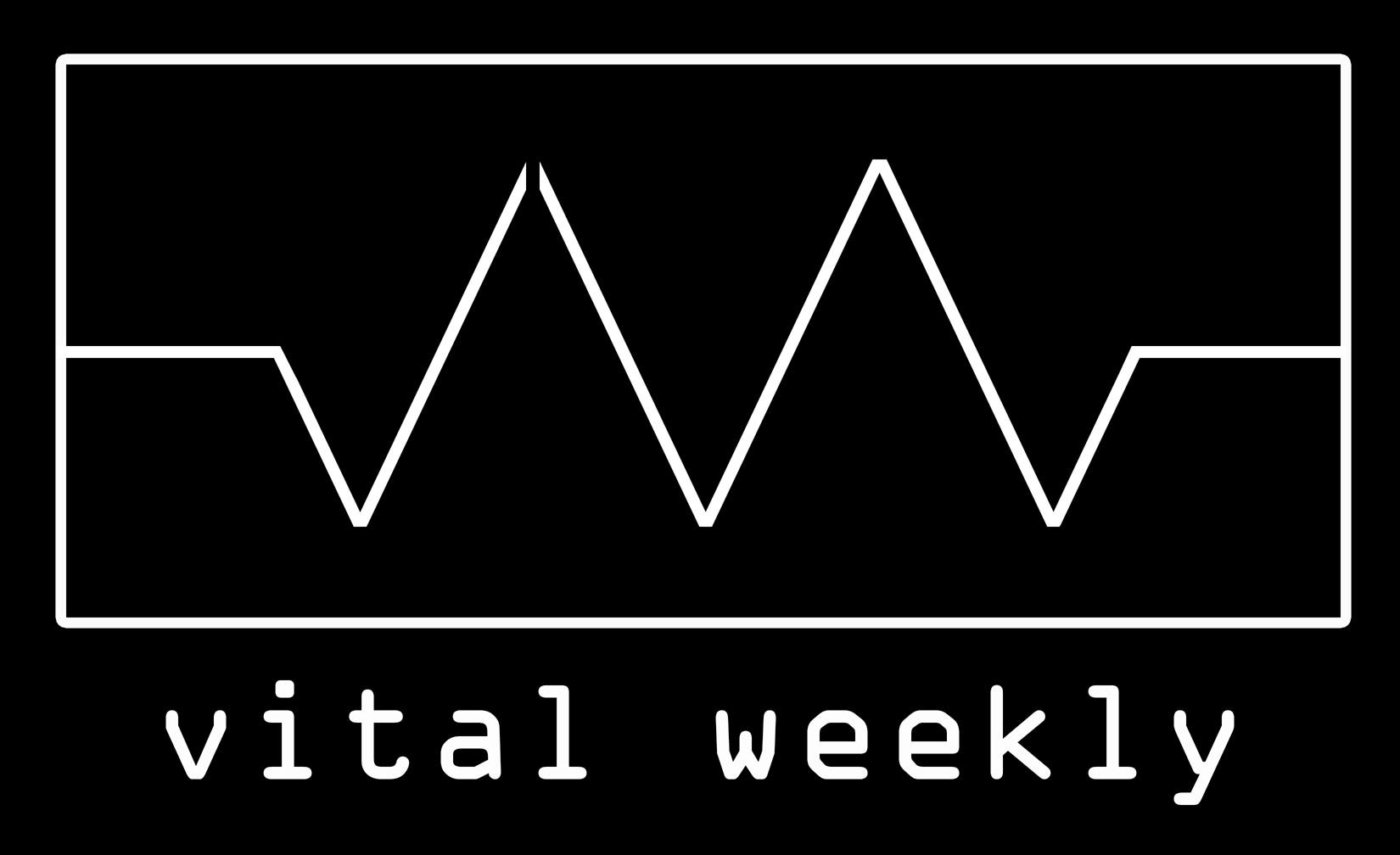
[Album Review] Wang Lu: Urban Inventory
An Earful: Best of 2018 So Far

In Review: Wang Lu Composer Portrait
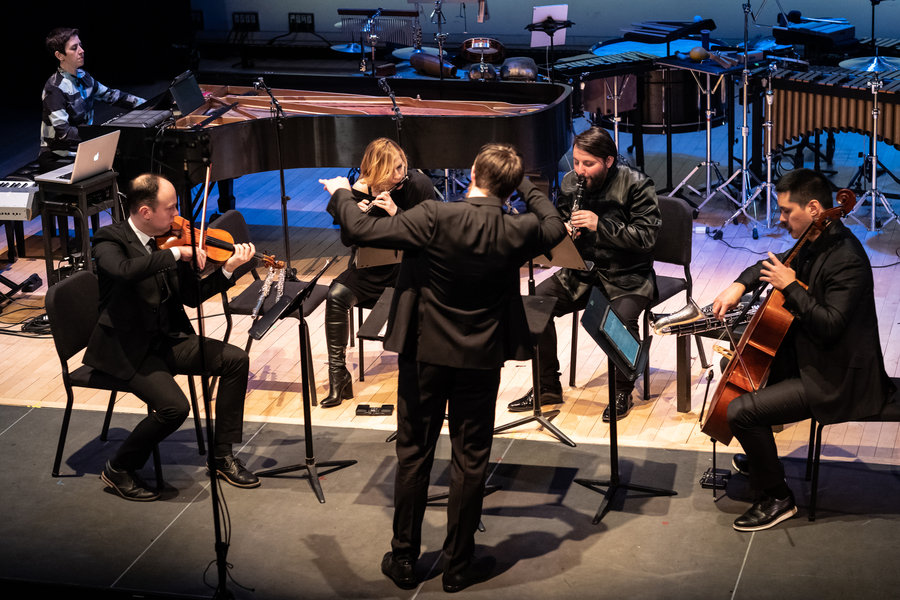 Photo by Rob Davidson
Photo by Rob Davidson"A-PPA-Aratus, the world premiere that concluded the evening, ditched the childhood memories, and with them the humor. According to the program note, the work is inspired by a massive textile factory and a collection of poetry written by workers, an ancient Greek poet, and teacher planning periods... The spare, solemn introduction was captivating enough, and early on the vibes led an almost-tonal passage of blithe serenity that wafted through, blissful and beautiful, on a passing cloud."

